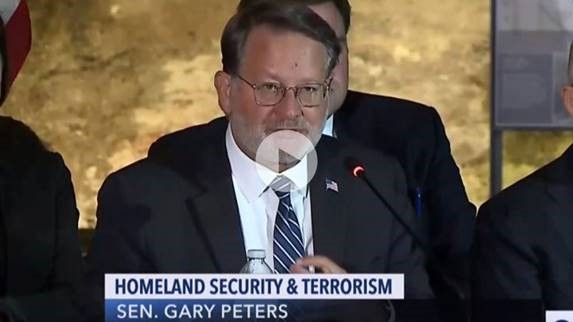VIDEO: Peters Delivers Remarks at 9/11 Memorial & Museum in New York City
Peters Pays Tribute to Victims of September 11th Attacks, Discusses New Generation of Threats Facing the Department of Homeland Security
WASHINGTON, DC – U.S. Senator Gary Peters (MI), Ranking Member of the Senate Homeland Security and Governmental Affairs Committee, today helped lead a hearing to discuss how the Department of Homeland Security (DHS) has secured the U.S. in the years since the September 11, 2001 attacks and how the Department must adapt to evolving and emerging national security threats in a rapidly changing world. The committee members were joined by former DHS Secretaries Michael Chertoff (2005-2009), Janet A. Napolitano (2009-2013), and Jeh C. Johnson (2013-2017).
Peters said, in part during the hearing, “As the threats to our homeland change, so must the efforts to protect our national security. With nearly two decades of lessons learned, the time has come for a clear-eyed assessment of what has worked and what needs to be improved. In order to build a more sustainable department and defend ourselves from global threats, we must look to the future. It is not enough to understand the threats of the moment. We must also ensure that DHS is prepared to anticipate and identify the threats of tomorrow. This is a difficult conversation, but one we must have to keep our country safe and ensure that we never again face a catastrophe like September 11th.”
Below is video and the text of Peters’ opening remarks:
“Thank you Chairman Johnson for convening this important hearing, and thank you to Alice Greenwald and the entire National September 11 Memorial & Museum staff for hosting us here today. I’m also grateful to our former Homeland Security Secretaries for joining us to share your thoughts as well as your expertise.
“This hallowed space is quiet and peaceful today. We are surrounded by the remnants of the towers that were destroyed and the treasured memories of 2,977 lives taken eighteen years ago at the World Trade Center, at the Pentagon, and in Shanksville, Pennsylvania.
“My colleagues and I had the opportunity to tour the museum and the memorial yesterday and the experience -- this extraordinary tribute to the lives that were lost in the most devastating attack on American soil, a tribute to the families who lost their loved ones, and the first responders who so bravely ran into danger to save the lives of others.
“Behind us is the Last Column, the final piece of steel that was removed from Ground Zero after the nine-month long recovery effort had ended. Today, it stands as a monument honoring the 441 first responders, police, firefighters, and rescue workers who gave their lives in the line of duty.
“This week, as we remember and honor the lives lost on September 11, 2001, we must also reflect on the lessons that we have learned in the years since as we work to prevent a tragedy like this from ever happening again.
"In the daysthe days following September 11th, our nation felt, for the first time, that we were vulnerable to the dangers of a very volatile world. In those frightful days, no one knew what the future would hold – only that we would rise from the rubble united and resolved to be stronger than ever.
“It was out of that uncertainty and determination to protect this nation from future attacks, that the Department of Homeland Security was founded.
“The new department, which rapidly grew to be one of our nation’s largest federal agencies, was comprised of nearly two dozen large and diverse agencies, many of which had operated for decades as independent actors. In the face of tragedy, these organizations, each with their own unique cultures and histories, coalesced around a very single and focused mission and under one banner.
“The Department of Homeland Security was created with one primary mission in mind – combatting the scourge of terrorism and ensuring that we could say with confidence: “never again.”
“However, in the years that have since passed, as the world around us has changed, so too have the challenges facing this great nation and this vital department.
“Today, DHS confronts a new generation of persistent and evolving threats, more complex and diffuse than we could have imagined just a few years ago.
“With each passing day, our world becomes more interconnected, cementing the important role cybersecurity plays in our everyday lives.
“A rise in violence driven by racism, religious discrimination and other hateful ideologies has altered our perception of domestic terrorism and the threats that they pose.
“And one of the gravest threats to our national security does not fly a flag or adhere to an ideology. Yet climate change poses and existential threat not to just the United States, but to our entire planet.
“The Department of Homeland Security is our first line of defense against these and many other challenges, some of which have evolved or risen since this department was created.
“As the threats to our homeland change, so must the efforts to protect our national security.
“With nearly two decades of lessons learned, the time has come for a clear-eyed assessment of what has worked and what needs to be improved.
“As we reflect on what the Department has accomplished to date, we must consider whether the size and the complexity of DHS can keep pace with the constantly evolving threats of a rapidly changing world.
“In order to build a more sustainable department and defend ourselves from global threats, we must look to the future. It is not enough to understand the threats of the moment. We must also ensure that DHS is prepared to anticipate and identify those threats arising in the future.
“This is a very difficult conversation, but one we must have to keep our country safe and ensure that we never again face a catastrophic event like September 11th.
###
